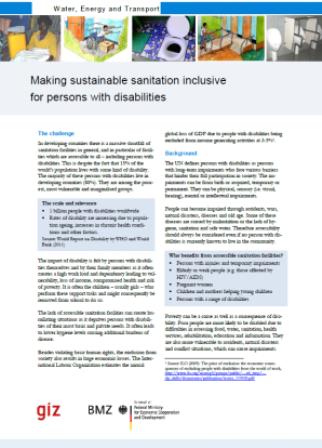Making sustainable sanitation inclusive for persons with disabilities - Factsheet
von Münch, E., Düring, I. (2011)

Published in: 2011
Publisher:
Deutsche Gesellschaft fuer Internationale Zusammenarbeit (GIZ) GmbH, Eschborn, Germany
Author:
von Münch, E., Düring, I.
Uploaded by:
SuSanA secretariat
Partner profile:
Deutsche Gesellschaft für Internationale Zusammenarbeit (GIZ) GmbH
10674 Views
288 Downloads
Content - Summary
This factsheet is intended for water/sanitation sector professionals in Germany and international development cooperations, especially those implementing water/sanitation programs in partner countries. It describes the challenges, scale of the problem, background, barriers which stop people with disabilities from accessing sanitation facilities, approach to sanitation system planning, technical adjustments for accessible toilets and additional costs.
It also gives one example for an innovative accessible dry toilet, the bench urine diversion dehydration toilet (UDDT). A main advantage of this type of dry toilet is that it can be indoors, thus reducing access distances compared to pit latrines. This also reduces security risks for women and girls with disabilities.
Bench UDDTs have particular advantages for accessibility:
- Due to urine separation, no flush water and the toilet’s ventilation system, the faeces dry out quickly, leaving no odour. The toilet can therefore be located indoors and even on any level of the house, reducing long walking distances.
- The bench is sturdier than a chair or commode over a pit latrine. The wide bench provides space for an assistant if needed, and handrails can easily be fixed next to the toilet.
- It is easier to empty the above ground faeces vaults of these toilets than the pits of pit latrines. There is also no need to relocate toilets when pits are full and cannot be emptied. This results in less dependence on outside help.
- This type of UDDT is accessible directly from the ground level and does not require access steps or ramps unlike conventional raised UDDTs.
Additional information
You can order hard copies by sending an e-mail to: ecosan@giz.de
Bibliographic information
von Münch, E., Düring, I. (2011). Making sustainable sanitation inclusive for persons with disabilities - Factsheet. Deutsche Gesellschaft fuer Internationale Zusammenarbeit (GIZ) GmbH, Eschborn, Germany
Filter tags
English Factsheets and policy briefs Intersectionality Practitioners Sustainable WASH in institutions and gender equality (WG7) Urine diversion dehydration toilets (UDDTs)














